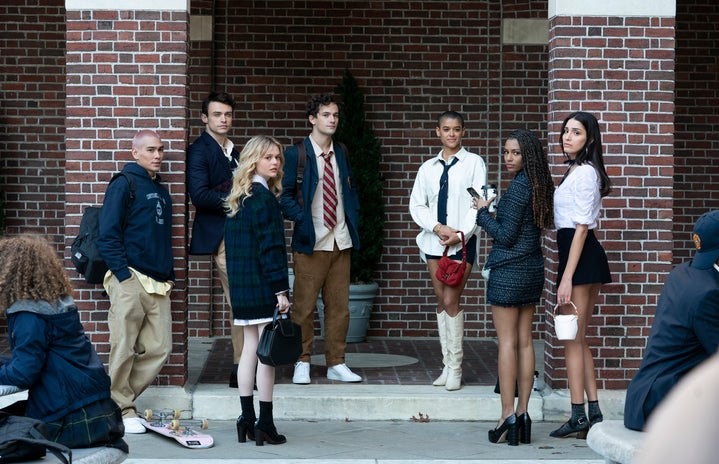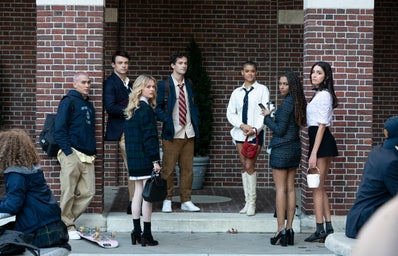The original Gossip Girl released in 2007 and received smash-hit reviews. Even years after its final airing, young adults binge the show on streaming platforms. While there are many similarities in characters, one of the main differences is viewers immediately start out knowing who Gossip Girl is; not to say there still isn’t tension and drama that occurs with the Instagram page. Now, the show is much more inclusive with an emphasis on sex positivity and queer relationships. By looking at Gossip Girl (2021) one can see how queerness functions in the first season of the show.
A much more interesting aspect to the show is how sex positive and queer it is this time around. The show includes characters like Max Wolfe (Thomas Doherty), Akeno “Aki” Menzies (Evan Mock), Rafa Caparros (Jason Gotay), and Audrey Hope (Emily Alyn Lind). Max Wolfe has queer fathers, (who have their own drama that affects Max in its own way) and growing up in an accepting household fosters Max to have a fluid sexuality. Aki and Audrey begin the season as a straight power couple, though it’s immediately clear to viewers that Aki is not straight. Aki is presented with a pink buzz cut and an NYC gay street style. Audrey, on the other hand, is a blonde beauty; she has a classic style that is typically sexed or edged up. She is very accepting of anyone from all backgrounds and lifestyles. Lastly, Rafa. Rafa plays a small, but important, roll in the series. He and Max end up rendezvousing, which causes Rafa to blackmail Gossip Girl a bit.
Viewers watch the characters grow, shift and change within the first season. The audience watches the character Aki grow from a “straight” boy into a bisexual human by breaking out of social norms. While Aki started out trying to conceal his sexuality through heterosexual norms, it came to a point where he couldn’t anymore. Viewers watch Aki grow into his sexuality with great tension and it’s a little messy. After watching Aki and Audrey struggle in the bedroom, viewers witness Max and Aki make out in a bathhouse – in episode two “She’s Having A Maybe” – when Max is pining over Rafa (their teacher), in an attempt to make Rafa jealous and want to sleep with Max. This prompts Aki to spiral and question his sexuality and performance. In episode three “Lies Wide Shut,” Aki confesses that he cheated on Audrey by making out with someone else to his best friend, Otto “Obie” Bergmann IV (Eli Brown), but he doesn’t provide details about who or what gender. Though, Audrey also cheats on Aki with Max earlier in the season. After struggling with an inner-battle, Aki’s father (a right-leaning old multimodal news media millionaire) outs him on live television to disregard allegations of his company being homophobic, in episode six “Parentsite.” At the end of that same episode, Max, Audrey and Aki all consummate their love for one another. This all comes out in episode seven, “Once Upon a Time in the Upper West,” where Aki, Audrey, Max and more of their friend group and parents surround the Thanksgiving table. Aki shares with everyone that he is bisexual, then they share they had a threesome. Most of their parents are proud more than anything, but it shows just how fluid and open their parents are too. There are still people in the group (Obie, Aki’s mother, etc.) who don’t quite understand Aki’s “new” identity.
Max, who is used to having emotionless sex, now struggles performing with other people. He eventually realizes that he has feelings for Audrey and Aki. Rather than telling them (which was his original plan), he pulls away and shuts them out. Audrey and Aki too struggle in their own relationship; they join apps to find other threesome hookups, go on dates with other people, and more, but in the episode 12 season finale “Gossip Gone, Girl,” Aki and Audrey realize that they need Max. At first, the couple thinks they can split Max like a custody agreement – coming off like there is no consent – which Max is not a fan of since his fathers are currently divorcing, and he knows the same fate will come of that. But eventually, the three decide that if one of them break up, all of them break up. Rather than a “throuple” the three form a “triad.” Audrey states, “It’s based on the fact all three sides of a triangle are equal” (episode twelve). While Max ends up agreeing, he is still cautious explaining how he’s never been in a real relationship with one person, let alone two. Then, the three of them share a compassionate hug, uniting their relationship. While this is a step in the right direction, it’s not exactly fully formed. The writers of the show really needed to research this a little more to make it make more sense.
In the society of Gossip Girl (2021), viewers see how this operates in the show; Max Wolfe, for example, never explicitly shares his sexuality, but it’s clear that he is quite fluid (likely pansexual). He can weave in and out of the categories of queer and heterosexual, while still being himself. He also claims in episode two “She’s Having a Maybe,” that he prefers to top, which is one of the first glimpses into Max’s sexual preferences. Aki, too, weaves through these categories and labels, but in a more difficult way; for much of the show, he struggles understanding his sexuality and trying to define himself, until he eventually finds a label that best works for him – even if at times he doesn’t like labeling himself. Meanwhile, Audrey at this present moment is straight, and all three share a deep emotional bond beyond sex, which is what makes the polyamorous relationship believable and non-offensive to real-life polyamorous queer couples. They show works hard to break the stereotype that people try polyamory when a bisexual person “can’t choose”; Audrey and Aki even see a couple’s counselor to determine the route of their disconnect and realize that their relationship works better with Max (episode eleven “You Can’t Take it With Jules”).
Overall, while the show takes many steps to begin making television more queer, there still needs to be much more research and consulting done to make this aspect of the show equitable for all.

